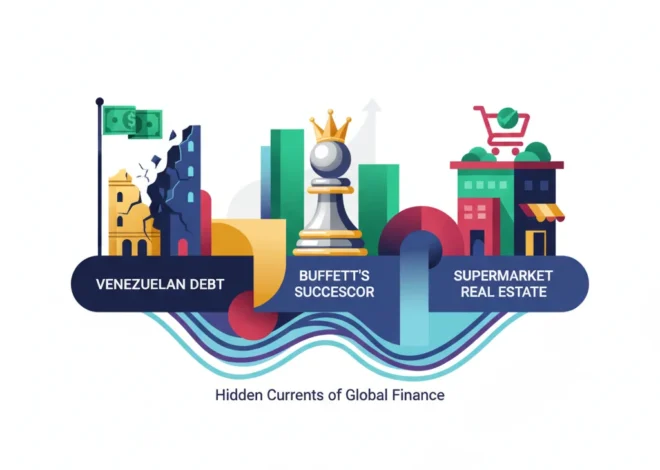Citigroup’s New CFO: Decoding the Strategic Shift in Wall Street’s Biggest Overhaul
In the high-stakes theater of global finance, every leadership change is a closely watched performance. When a titan like Citigroup shuffles its top deck, it’s more than just a personnel update; it’s a powerful signal to investors, employees, and the entire stock market. The recent announcement that Anand Selva, the current head of the lender’s U.S. personal banking division, will step into the role of Chief Financial Officer is a pivotal scene in CEO Jane Fraser’s ambitious corporate epic—a story of transformation, simplification, and a relentless pursuit of profitability.
This move, effective in March, sees the retirement of veteran CFO Mark Mason and the promotion of an executive deeply entrenched in the operational trenches of consumer finance. It’s a decision that speaks volumes, suggesting that the next chapter of Citigroup’s revitalization is less about grand strategy and more about disciplined, on-the-ground execution. For a banking giant that has long been criticized for its complexity and lagging returns, this appointment is a calculated bet on operational excellence. But what does it truly mean for the future of Citigroup, the broader banking industry, and the investors who hang on every decision?
The Backdrop: A Monumental Restructuring
To understand the significance of Anand Selva’s appointment, one must first grasp the sheer scale of the transformation underway at Citigroup. Since taking the helm in 2021, CEO Jane Fraser has embarked on the most significant overhaul of the bank in nearly two decades. Dubbed internally as “Project Bora Bora,” the plan is a radical effort to streamline a notoriously complex organization, shed non-core assets, and boost returns that have persistently trailed competitors like JPMorgan Chase and Bank of America.
The core of this strategy involves collapsing the bank’s structure from two major divisions into five core, interconnected businesses: Services, Markets, Banking, U.S. Personal Banking, and Wealth. This reorganization aims to eliminate bureaucratic layers, improve accountability, and accelerate decision-making. However, this process has been challenging, involving significant job cuts and a fundamental rewiring of the bank’s internal culture. The bank has been operating under regulatory consent orders since 2020 from the Federal Reserve and the Office of the Comptroller of the Currency, demanding improvements in its risk management and internal controls—a challenge that adds immense pressure to the restructuring efforts (source). The CFO is not just a gatekeeper of the financials in this environment; they are a central architect of this complex, multi-year turnaround.
The Paradox of India's Growth: Why a Booming Economy is Begging for a Spending Spree
A Changing of the Guard: From a Veteran Steward to an Operational Architect
Mark Mason’s retirement marks the end of an era. A 22-year veteran of Citigroup, Mason has been the CFO since 2019, steering the bank’s finances through the pandemic, volatile markets, and the initial phases of Fraser’s overhaul. His departure, while planned, creates a critical vacancy at a delicate time.
Enter Anand Selva. His profile presents a fascinating contrast and a clear indication of Fraser’s priorities. Where a traditional CFO might come from investment banking or treasury, Selva’s career has been forged in the engine room of consumer finance. He has been instrumental in leading the U.S. Personal Banking division, a key revenue generator and a battleground for innovation in financial technology. This background suggests a deep, practical understanding of profitability drivers, operational efficiency, and the digital transformation sweeping through the banking sector.
Let’s compare the outgoing and incoming finance chiefs:
| Metric | Mark Mason (Outgoing CFO) | Anand Selva (Incoming CFO) |
|---|---|---|
| Primary Background | Broad institutional finance, treasury, and corporate strategy. Served as CFO for various major Citi divisions. | Consumer and personal banking, wealth management, and operational leadership. |
| Key Experience | Navigating complex global financial markets, capital management for the entire institution, investor relations. | Managing a large-scale P&L, driving digital transformation in retail banking, focusing on customer-facing products. |
| Perceived Strengths | Deep institutional knowledge, steady hand during crises, experience with global regulatory frameworks. | Proven operational expertise, track record of executing on strategy, deep understanding of a core revenue engine. |
| Symbolism of Role | Represents a legacy of institutional stability and broad financial stewardship. | Represents a new focus on execution, efficiency, and connecting financial strategy directly to business operations. |
By selecting Selva, Fraser is signaling that the blueprint for the new Citigroup is complete. Now, it’s time to build, and she needs an architect who knows how to manage the construction site, not just design the skyscraper.
Implications for the Stock Market, Investing, and the Broader Economy
For investors, leadership clarity is paramount. The appointment of an internal, trusted lieutenant like Selva provides a degree of continuity and reinforces the message that the overhaul strategy remains firmly on track. The initial reaction from the stock market is likely to be one of cautious approval. The move removes uncertainty around a key C-suite position and installs a leader whose mandate will be to translate restructuring efforts into tangible financial results—namely, an improved return on tangible common equity (RoTCE), a key metric for bank investors (source).
This decision also has ripple effects across the **banking** sector. It highlights a growing trend where operational leaders are being elevated to top strategic finance roles. In an era defined by digital disruption and intense competition, the ability to execute flawlessly is becoming just as critical as financial engineering. Other major banks may take note, considering their own leadership pipelines and whether their top finance executives have sufficient hands-on experience in core business lines.
From a macroeconomic perspective, the health of Citigroup matters. As one of the world’s largest banks, its ability to operate efficiently and lend effectively is crucial for global **economics**. A streamlined, more profitable Citigroup is a more stable component of the international financial system. This internal focus on shoring up its own foundation is, in the long run, a positive development for the wider **economy**.
Ghosts of Economic Past: Why a 1970s Socialist Blueprint Still Haunts Modern Finance
The Fintech Imperative: A CFO for the Digital Age
No discussion of modern banking is complete without addressing the impact of **financial technology**, or **fintech**. The role of a bank CFO has evolved dramatically; it’s no longer just about spreadsheets and regulatory filings. Today’s CFO must be a technology strategist, overseeing vast IT budgets and understanding how innovations from AI to **blockchain** could reshape the industry.
Anand Selva is uniquely positioned in this regard. His leadership of the U.S. Personal Banking division has put him on the front lines of the digital arms race. He has contended with the rise of neobanks, the demand for seamless mobile banking experiences, and the integration of new payment technologies. This experience is invaluable. The future of banking profitability is inextricably linked to technology. A CFO who understands this from an operational, customer-facing perspective is a significant asset. He is better equipped to ask the right questions about technology investments, measure their ROI, and ensure that IT spending is directly aligned with the bank’s core business objectives. As Citigroup continues to invest billions in modernizing its infrastructure, having a CFO who has lived and breathed digital transformation is a strategic advantage (source).
The Road Ahead: Execution is Everything
Citigroup’s appointment of Anand Selva as its next CFO is a clear, decisive move that aligns leadership with the next critical phase of its transformation. It’s an endorsement of operational expertise and a signal to the market that the era of painful, strategic planning is giving way to a period of focused execution. Selva’s challenge will be to apply his deep understanding of consumer banking to the vast, complex machinery of a global financial institution.
Primal Finance: What Chimpanzee Behavior Teaches Us About Modern Investing
For Jane Fraser, this move further solidifies her leadership team as she works to deliver on her promise of a simpler, more profitable bank. The path ahead is still fraught with challenges, from regulatory hurdles to intense market competition. But with this latest decision, the message from the top of Citigroup is unambiguous: the strategy is set, the team is in place, and now, it’s all about the execution. The world of **finance** and **investing** will be watching to see if this new leadership dynamic can finally unlock the value that has long been dormant within this Wall Street giant.


